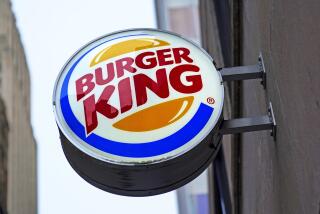King Cobra Capsules Wriggle Out of Trouble With Regulatory Agency
- Share via
Hissing reptilians normally figure only in adventure-movie screenplays and, occasionally, into the path of wayward vacationers. Rarely, however, are they incorporated into 250-milligram capsules.
Such was the case earlier this year when a concentration of snakes created trouble for a Korean food importer in New York City. The problem began when a company called Chan International made unsubstantiated claims for its “Go-Starmin King Cobra Powder” in Korean-language newspapers.
A conscientious pharmacist alerted federal health officials to cobra capsule advertisements that bordered on the outrageous. The questionable ads suggested that the tablets be taken for “enhancement of sexual capability, increas(ing) appetite, restor(ation) from fatigue, (improving) blood circulation, prevent(ing) aging, skin care and (as a) cure for various women’s diseases.”
“A tall order, even for a long snake,” according to a report of the incident in FDA Consumer magazine.
What prompted the government’s curiosity was not necessarily that someone was promoting snake pills. Rather, the problem involved selling these serpentine tablets and stating that their curative powers were unlimited without offering proper scientific support.
Consequently, the Food and Drug Administration accused Chan International of marketing “an unapproved new drug,” forcing the firm to discontinue sales.
Despite the advertising gaffe, the FDA was convinced that the capsules did indeed contain king cobra remnants. This particular snake is native to Southeast Asia and is “very poisonous” when in its natural slithering state. The shipment in question originated in Thailand and contained “cobras that have been dried and ground up,” the agency reported.
Apparently curious about these “unusual” tablets, the FDA ordered a laboratory analysis of the King Cobra Powder and found that “the product contained protein, fat, carbohydrates, sodium, phosphorus and calcium.”
Satisfied that the snake powder contained nothing out of the ordinary, no objections were raised when another New York-based firm relabeled the tablets, dropped all the medical claims and sold them as just plain King Cobra capsules.
The California Fish--Folklore indicates that catfish roam on the muddy bottoms of ponds and rivers in the Deep South, where they’re prized on dinner plates after being coated in cornmeal and fried in iron skillets. Technology, on the other hand, can demythologize things rather quickly.
The California climate, being nicely suited to aquaculture, is responsible for the major success of fish farmers here. In fact, Aquaculture Digest reports that 1984 was a record production year for the state’s farm-grown catfish.
About 2.5 million pounds of this whiskered, ornery fish was brought to market from California’s artificial ponds. This year the forecast is for an even greater harvest, possibly as much as 3 million pounds, from the state’s 2,000 acres currently devoted to catfish production, the magazine reported.
The increasing investment in catfish has apparently boosted its production level beyond that of farm-raised trout, which were previously the leading aquaculture product in the state.
A Fast Rating--As part of its campaign to force fast-food restaurants to provide ingredient labeling on the packaging for hamburgers, fries, chicken bits, etc., the Center for Science in the Public Interest evaluated a number of the quick eater’s staples.
The consumer group’s in-depth look at what exactly is in a Big Mac and the like was intended to reveal that some items are more caloric than they look. The review resulted in the publication of a best and a worst list based on a comparison of calories, fat content and sodium levels.
The center took critical aim at croissant sandwiches, stuffed potatoes, fried chicken and breakfast biscuits as being riddled with fat and sodium. Some particular foods were singled out for special mention.
“ ‘Breakfast on a grease bun’ is what you get with the new line of croissant sandwiches sold at Roy Rogers, Burger King, Jack in the Box and Arby’s,” the review stated. Some of these breakfast offerings contained the equivalent of 11 pats of butter and 1,200 milligrams of sodium, the center’s review stated.
While finding no fault with a plain baked potato, the fast food study was critical of how the chains topped the tubers. Wendy’s Cheese Stuffed Potato was disparaged for having more fat and calories than a McDonald’s Big Mac.
The fried chicken variations fared no better in the study, which warned that “The health-conscious consumer has to be wary of all (fast-food) chicken dishes nowadays.” In fact, after reviewing such popular offerings as McDonald’s Chicken McNuggets and Burger King’s Specialty Chicken Sandwich, the report called this category a “sorry bunch” for being saturated in shortening and often weighing in at 50% fat.
The breakfast biscuits fell prey to the same problems. McDonald’s Ham Biscuit contained 1,949 milligrams of sodium per serving, making it “one of the highest sodium levels of all the fast foods we examined.” Of another item, the center’s review stated, “. . . if breakfast consists of a McDonald’s Sausage Biscuit, you may be better off waiting for lunch.”
Those items that made the best list and received praise from the center included the (low-calorie) baked fish at Long John Silver’s restaurants, the (low-calorie) shrimp salad at Jack in the Box and the Multi-Grain Bun offered on some sandwiches at Wendy’s.
The report offered little overall commendation to the fast-food industry for its efforts to provide a more nutritious selection of foods. The report rhetorically asked, “Is fast food on the verge of becoming respectable? Don’t count on it.”
More to Read
Inside the business of entertainment
The Wide Shot brings you news, analysis and insights on everything from streaming wars to production — and what it all means for the future.
You may occasionally receive promotional content from the Los Angeles Times.










